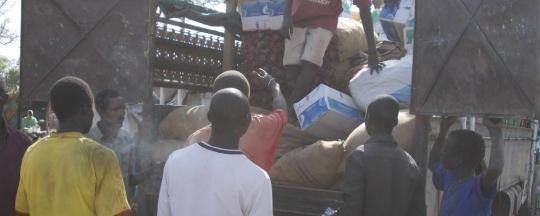Three trucks loaded with food items from Juba have arrived in Aniet market in the Abyei Area, including sugar, flour and cooking oil.
South Sudan’s government subsidized the purchase of these food items by providing dollars to traders at the preferential rate of about 3 to 1, which is more than three times less the street rate that marks the real value of the South Sudanese pound for most citizens.
A number of government institutions in Juba are delegated by the Bank of South Sudan to select which businessmen are given dollars at this preferential rate through a so-called ‘letter of credit’. Each state plus Abyei Area and Pibor Administrative Area is also given a block of cash to distribute.
Abyei Today reported that the Director-General of the Abyei Ministry of Finance, Monyjok Kuol, said the newly imported food would be sold at lower prices than normal, to help people struggling with rising costs. In Aniet market, the price of a bag of sugar has gone down from 750 to 700 ssp, a bag of flour has fallen from 850 to 750, and a 20-liter jerrycan of cooking oil has fallen from 400 to 300 ssp.
Meanwhile, the chamber of commerce in Agok has ordered traders to cut the price of sorghum by half. The cost of a single malwa doubled recently, from 25 to 50 SSP. The chamber’s information secretary, Bol Chol, said there was no reason that locally-produced food should be so expensive.
As food prices have risen so have malnutrition rates. The humanitarian organization GOAL Ireland has reported an increase in the number of cases of malnutrition among children aged 6 months to 5 years. Frank Aldo, a nutrition co-ordinator told Abyei Today they were seeing more than 140 children each month this year, compared to fewer than 100 every month last year.
File photo




